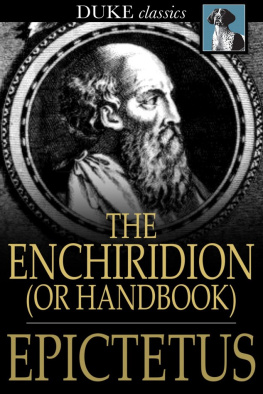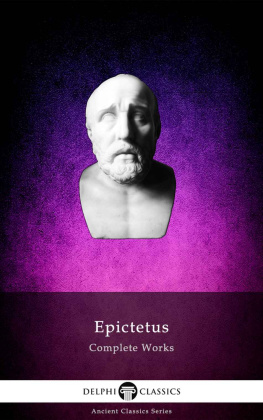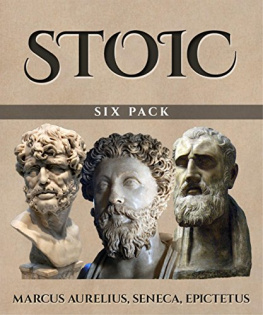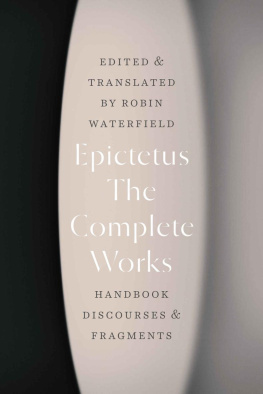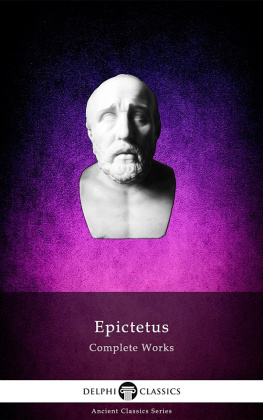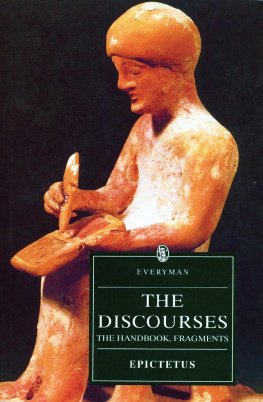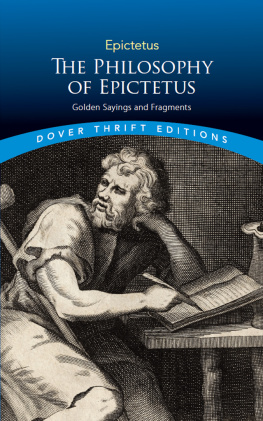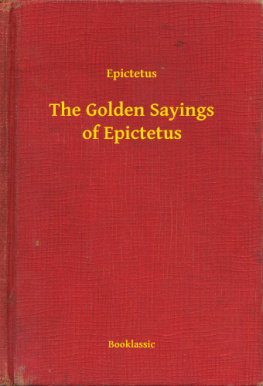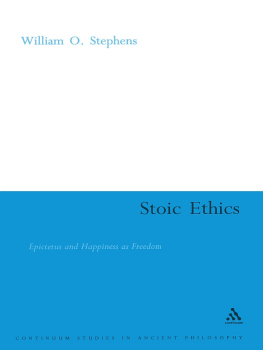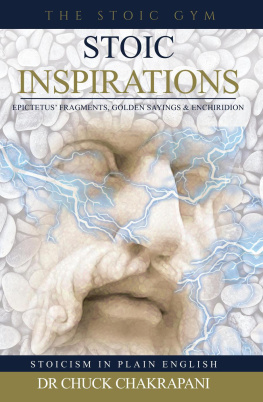THE ENCHIRIDION, OR HANDBOOK
WITH A SELECTION FROM THE DISCOURSES OF EPICTETUS
* * *
EPICTETUS
Translated by
GEORGE LONG
*
The Enchiridion, or Handbook
With A Selection from the Discourses of Epictetus
From an 1888 edition
ISBN 978-1-62011-413-1
Duke Classics
2012 Duke Classics and its licensors. All rights reserved.
While every effort has been used to ensure the accuracy and reliability of the information contained in this edition, Duke Classics does not assume liability or responsibility for any errors or omissions in this book. Duke Classics does not accept responsibility for loss suffered as a result of reliance upon the accuracy or currency of information contained in this book.
Contents
*
Epictetus
*
Very little is known of the life of Epictetus. It is said that he was anative of Hierapolis in Phrygia, a town between the Maeander and abranch of the Maeander named the Lycus. Hierapolis is mentioned in theepistle of Paul to the people of Colossae (Coloss. iv., 13); from whichit has been concluded that there was a Christian church in Hierapolis inthe time of the apostle. The date of the birth of Epictetus is unknown.The only recorded fact of his early life is that he was a slave in Rome,and his master was Epaphroditus, a profligate freedman of the EmperorNero. There is a story that the master broke his slave's leg bytorturing him; but it is better to trust to the evidence of Simplicius,the commentator on the Enchiridion, or Handbook, who says that Epictetuswas weak in body and lame from an early age. It is not said how hebecame a slave; but it has been asserted in modern times that theparents sold the child. I have not, however, found any authority forthis statement.
It may be supposed that the young slave showed intelligence, for hismaster sent or permitted him to attend the lectures of C. MusoniusRufus, an eminent Stoic philosopher. It may seem strange that such amaster should have wished to have his slave made into a philosopher; butGarnier, the author of a "Mmoire sur les Ouvrages d'Epictte," explainsthis matter very well in a communication to Schweighaeuser. Garniersays: "Epictetus, born at Hierapolis of Phrygia of poor parents, wasindebted apparently for the advantages of a good education to the whim,which was common at the end of the Republic and under the firstemperors, among the great of Rome to reckon among their numerous slavesgrammarians, poets, rhetoricians, and philosophers, in the same way asrich financiers in these later ages have been led to form at a greatcost rich and numerous libraries. This supposition is the only one whichcan explain to us how a wretched child, born as poor as Irus, hadreceived a good education, and how a rigid Stoic was the slave ofEpaphroditus, one of the officers of the imperial guard. For we cannotsuspect that it was through predilection for the Stoic doctrine, and forhis own use, that the confidant and the minister of the debaucheries ofNero would have desired to possess such a slave."
Some writers assume that Epictetus was manumitted by his master, but Ican find no evidence for this statement. Epaphroditus accompanied Nerowhen he fled from Rome before his enemies, and he aided the miserabletyrant in killing himself. Domitian (Sueton., Domit. 14), afterwards putEpaphroditus to death for this service to Nero. We may conclude thatEpictetus in some way obtained his freedom, and that he began to teachat Rome; but after the expulsion of the philosophers from Rome byDomitian, A.D. 89, he retired to Nicopolis in Epirus, a city built byAugustus to commemorate the victory at Actium. Epictetus opened a schoolor lecture room at Nicopolis, where he taught till he was an old man.The time of his death is unknown. Epictetus was never married, as welearn from Lucian (Demonax, c. 55, torn, ii., ed. Hemsterh., p. 393).When Epictetus was finding fault with Demonax, and advising him to takea wife and beget children, for this also, as Epictetus said, was aphilosopher's duty, to leave in place of himself another in theuniverse, Demonax refuted the doctrine by answering: Give me then,Epictetus, one of your own daughters. Simplicius says (Comment., c. 46,p. 432, ed. Schweigh.) that Epictetus lived alone a long time. At lasthe took a woman into his house as a nurse for a child, which one ofEpictetus' friends was going to expose on account of his poverty, butEpictetus took the child and brought it up.
Epictetus wrote nothing; and all that we have under his name was writtenby an affectionate pupil, Arrian, afterwards the historian of Alexanderthe Great, who, as he tells us, took down in writing the philosopher'sdiscourses ("Epistle of Arrian to Lucius Gellius," p. i). TheseDiscourses formed eight books, but only four are extant under the titleof (Epichtaeton diatribai). Simplicius, in his commentary on the(Enchiridion) or Handbook, states that this work also was puttogether by Arrian, who selected from the discourses of Epictetus whathe considered to be most useful, and most necessary, and most adapted tomove men's minds. Simplicius also says that the contents of theEnchiridion are found nearly altogether and in the same words invarious parts of the Discourses. Arrian also wrote a work on the lifeand death of Epictetus. The events of the philosopher's studious lifewere probably not many nor remarkable; but we should have been glad ifthis work had been preserved, which told, as Simplicius says, what kindof man Epictetus was.
Photius (Biblioth., 58) mentions among Arrian's works "Conversationswith Epictetus," (Homiliai Epichtaeton), in twelve books. Uptonthinks that this work is only another name for the Discourses, and thatPhotius has made the mistake of taking the Conversations to be adifferent work from the Discourses. Yet Photius has enumerated eightbooks of the Discourses and twelve books of the Conversations.Schweighaeuser observes that Photius had not seen these works of Arrianon Epictetus, for so he concludes from the brief notice of these worksby Photius. The fact is that Photius does not say that he had read thesebooks, as he generally does when he is speaking of the books which heenumerates in his Bibliotheca. The conclusion is that we are not certainthat there was a work of Arrian entitled "The Conversations ofEpictetus."
Upton remarks in a note on iii., 23 (p. 184, Trans.), that "there aremany passages in these dissertations which are ambiguous or ratherconfused on account of the small questions, and because the matter isnot expanded by oratorical copiousness, not to mention other causes."The discourses of Epictetus, it is supposed, were spoken extempore, andso one thing after another would come into the thoughts of the speaker(Wolf). Schweighaeuser also observes in a note (ii., 336 of his edition)that the connection of the discourse is sometimes obscure through theomission of some words which are necessary to indicate the connection ofthe thoughts. The reader then will find that he cannot always understandEpictetus, if he does not read him very carefully, and some passagesmore than once. He must also think and reflect, or he will miss themeaning. I do not say that the book is worth all this trouble. Every manmust judge for himself. But I should not have translated the book, if Ihad not thought it worth study; and I think that all books of this kindrequire careful reading, if they are worth reading at all.
G.L.
A Selection from the Discourses of Epictetus

